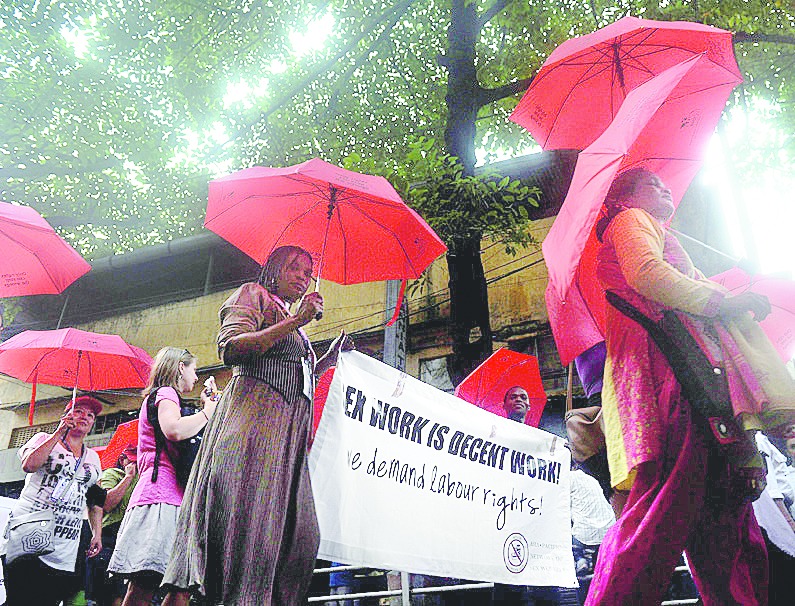
Trafficking and forced migration are widely prevalent in South Asia. India, Bangladesh, Nepal, and Sri Lanka are simultaneously source, transit and destination countries for trafficked and migrant women. In popular discourse, trafficking is associated with trafficking for sex work. However, this is only a subset of those women who are trafficked. High rates of poverty, political upheavals, low levels of education and unequal development have forced some women to move in a bid to improve their livelihoods. These are among the political and economic pressures that make women vulnerable to trafficking and subjects of voluntary migration.
At present, the lion's share of financing reserved for anti-trafficking efforts is directed towards ending sex work. Governments, especially Western governments, have made this a key foreign policy and domestic focus. As a result, the billions of dollars spent to end trafficking have amounted, per se, to a crusade against sex work.
Rather than addressing the structural causes of trafficking and forced migration, anti-traffickers have embraced raid-and-rescue operations to 'save' trafficked women and girls from the sex trade. Such operations have become a stock intervention for social 'crusaders', border-security agents and the police. This strategy, which relies on law enforcement and the criminal justice system, is favoured in the subcontinent; paternalistic values to "protect" and "control" women are reaffirmed. Even for the protection of trafficked minors, more measures need to be implemented to secure their well-being than rescue alone.
If you listen to women who have been targeted by raid-and-rescue operations, they will tell you that the women being 'saved' face further rights violations in the "rescue" process. For instance, those 'rescued' may find themselves in unsafe 'homes' where they face further sexual abuse from their custodians and the police. Those 'returned' to their homes may tell you that these are homes that they left voluntarily, homes where they are now stigmatized and even more vulnerable to attack.
It is not only women being trafficked for sex work who have been picked up in these rescue operations. There are numerous instances of women who have been forced to migrate in search of better economic opportunities that have been caught in these raids and returned to areas where they had made the choice to leave to improve their livelihood options.
A raid-and-rescue approach alone fails to address the larger issue of trafficking where many women - even those moving in search of jobs - find themselves in extremely vulnerable and exploitative circumstances. Two recent cases of extreme abuse suffered by migrant women made the headlines across the globe. In one case, two Nepali maids, ages 30 and 50, were repeatedly beaten and raped in their employer's luxury apartment in New Delhi. The employer, a Saudi diplomat, rushed home and claimed immunity from prosecution. In the second case, Munirathinam, a worker from Tamil Nadu, suffered a catalogue of abuses as a domestic worker in Riyadh. Her employer severed her hand when she reported the abuse.
These are just two publicized cases where women who voluntarily migrated found themselves in work environments where they were stripped of their rights and made vulnerable to physical, sexual and mental abuse. Their traumatic stories reveal the unregulated and unsafe working conditions that millions like them confront in a struggle to keep body and soul together.
Trafficking in women and children - as defined by the Palermo protocols - encompasses far more than trafficking for sexual exploitation. Indeed, they define trafficking to include the "recruitment, transportation, transfer, harbouring, or receipt of persons" by means of "threat or use of force or other forms of coercion, of abduction, of fraud, of deception, of the abuse of power or of a position of vulnerability, or of the giving or receiving of payments or benefits to achieve the consent of a person having control over another person, for the purpose of exploitation."
By this definition, exploitation includes, at a minimum, "the exploitation of the prostitution of others or other forms of sexual exploitation, forced labour or services, slavery or practices similar to slavery, servitude, or the removal of organs." The Palermo protocols were adopted by the United Nations general assembly in 2000 and entered into force in December, 2003; 168 countries have ratified them. Clearly, both the Nepali domestic workers and Munirathinam are victims of trafficking.
It is imperative that strict measures be taken against those traffickers engaged in all forms of trafficking be it for the sex trade, for exploitative work or the organ trade. Some women's rights, human rights, labour, and sex worker organizations in South Asia and abroad are challenging anti-trafficking discourse, policies, and programs that undermine rights. They are working to ensure safer migration, worker's rights and greater bargaining power to surmount the exploitative labour conditions in which millions are mired. Most laudable has been their bid to shift the anti-trafficking frame to one that is rights-based. Some sex worker led organizations have been successful in ensuring better working conditions for those in the trade through training in rights and negotiations for safer sex. Vigilance committees have been set up by sex workers to ensure that women - and especially under-age girls - are not trafficked into the industry.
The exigencies of women who migrate to find employment must be understood. Most migrant women are engaged in unprotected domestic, industrial, petty trade or sex work. They travel great distances in precarious conditions in pursuit of unregulated work; social protections are non-existent. Yet somehow, against all odds, they manage to save and send money home to support their families.
Sex work is work - whether or not one approves of it - and it is work that some women choose to do. The reasons for migration and choice of work are complex. Some domestic or construction workers also engage in sex work. They may trade sexual services for a range of reasons, or be forced to provide sexual favours. Selecting or including sex work as part of a labour and livelihood strategy is a rational economic decision for many.
Migrant women workers must be recognized as rights bearers and respected for their courage and resilience - regardless of the work they choose to do - clearly like all of us they live in the realm of constrained choice. They need to have the right to collective organizing and to have a voice in policy discourses that directly have an impact on their lives.
A rights-based approach to end forced and involuntary labour ensures that workers know their rights, stay safer as they migrate in search of work opportunities, have their work recognized and not stigmatized, work in regulated and non-exploitative work environments, are allowed to quit the work when they elect to do so and have a voice in policies that have an impact on their lives.










